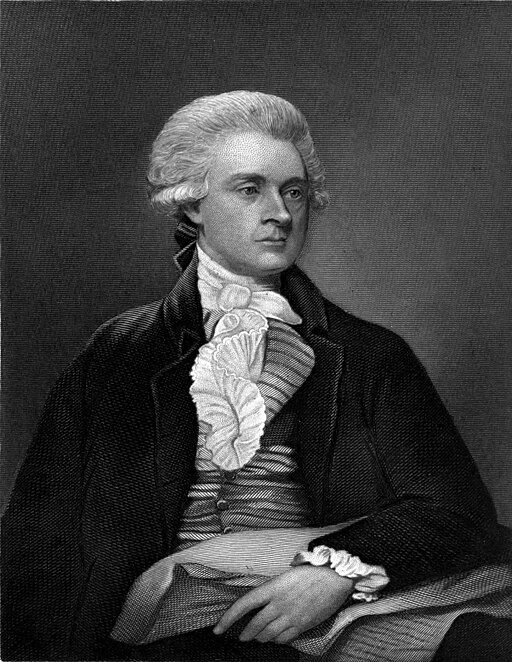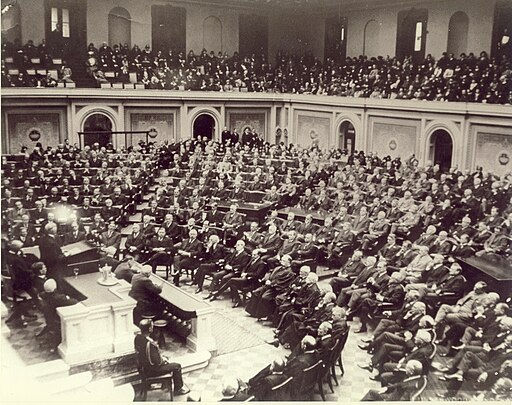How the State of Union Address Began
- Brent Hecht
- Sep 10, 2023
- 6 min read
Updated: Jan 25, 2024
Woodrow Wilson Begins Delivering the State of Union In Person
In 1913, Woodrow Wilson started the American tradition of delivering the State of The Union Address to Congress in person on December 2, 1913 after taking office in March 1913.
The practice of delivering the speech in person had been discontinued since 1800, when John Adams gave his last State of Union Address before Thomas Jefferson became president. Jefferson's presidency ended what historians call the 'Federalist Era', and Jefferson denounced the practice, comparing it to the king or queen’s speech from the throne in Britain.

Since 1801, the address had been delivered in writing, but in 1913, President Wilson restarted the oral tradition, using it as an opportunity to engage the public more visibly. During each year of his presidency he continued delivering the speech in person, giving his last address in December 1920. The year1920 marked the age of the radio when the first broadcast of presidential election results were aired and from thenceforth, the president had a direct line to the American people, making it even more beneficial to deliver the State of the Union Address in person. President Calvin Coolidge delivered the first address that was broadcast via radio in 1923.
Woodrow Wilson's 1913 State of the Union Address
During his first address to Congress in 1913, Wilson began by stating,
I shall ask your indulgence if I venture to depart in some degree from the usual custom of setting before you in formal review the many matters which have engaged the attention and called for the action of the several departments of the Government or which look to them for early treatment in the future, because the list is long, very long, and would suffer in the abbreviation to which I should have to subject it.1
President Wilson closed his 1913 address with this paragraph.
May I not express the very real pleasure I have experienced in cooperating with this Congress and sharing with it the labors of common service to which it has devoted itself so unreservedly during the past seven months of uncomplaining concentration upon the business of legislation? Surely it is a proper and pertinent part of my report on "the state of the Union" to express my admiration for the diligence, the good temper, and the full comprehension of public duty which has already been manifested by both the Houses; and I hope that it may not be deemed an impertinent intrusion of myself into the picture if I say with how much and how constant satisfaction I have availed myself of the privilege of putting my time and energy at their disposal alike in counsel and in action.2
At another point in the speech, he is quoted as saying this in the context of providing certain work benefits to railroad workers.
We ought to devote ourselves to meeting pressing demands of plain justice like this as earnestly as to the accomplishment of political and economic reforms. Social justice comes first. Law is the machinery for its realization and is vital only as it expresses and embodies it. 3
Here is a list of other issues that President Wilson addressed during his first delivery of the State of the Union.
He acknowledged the state of peace in the world which he believed foreshadowed years of peace to come.
To maintain peace he recommended new "treaty obligations and the interpretation of those already assumed."
He addressed concerns about the despot Huerta ruling in Mexico and claimed America cannot be sure about the prospect for peace until he is removed.
He wanted Congress to establish more thorough legislation surrounding The Sherman-Antitrust act. This was a large part of his New Freedom presidential campaign in 1912.
He urged new legislation to be passed for the selection of presidential nominees as well as other political offices through a system of "primaries."
He acknowledged the territories that the United States had acquired in Puerto Rico, Hawaii, and the Philippines and briefly gave direction on how he intended to handle them.
He stated that we should begin investing in the territory of Alaska by beginning to build a rail system as well as ports.
He wanted the Bureau of the Mines to focus on making mines more economical while also making them more safe for workers.

Last but not least, he addressed the need to pass the Federal Reserve Act which would create the Federal Reserve central bank. The Federal Reserve Act was passed on December 23, 1913. Here is what he said regarding the Federal Reserve Act.
You already have under consideration a bill for the reform of our system of banking and currency, for which the country waits with impatience, as for something fundamental to its whole business life and necessary to set credit free from arbitrary and artificial restraints. I need not say how earnestly I hope for its early enactment into law. I take leave to beg that the whole energy and attention of the Senate be concentrated upon it till the matter is successfully disposed of. And yet I feel that the request is not needed-that the Members of that great House need no urging in this service to the country.4
Woodrow Wilson also shared in his message how he believed that the Federal Reserve Act along with intervention from the Agricultural Department would help farmers by providing them with the financial credit they need to operate their business.
Woodrow Wilson's 1920 State of the Union Address
On December 7, Woodrow Wilson gave his last State of the Union address. This was his opening paragraph.
When I addressed myself to performing the duty laid upon the President by the Constitution to present to you an annual report on the state of the Union, I found my thought dominated by an immortal sentence of Abraham Lincoln's--"Let us have faith that right makes might, and in that faith let us dare to do our duty as we understand it"--a sentence immortal because it embodies in a form of utter simplicity and purity the essential faith of the nation, the faith in which it was conceived, and the faith in which it has grown to glory and power. With that faith and the birth of a nation founded upon it came the hope into the world that a new order would prevail throughout the affairs of mankind, an order in which reason and right would take precedence over covetousness and force; and I believe that I express the wish and purpose of every thoughtful American when I say that this sentence marks for us in the plainest manner the part we should play alike in the arrangement of our domestic affairs and in our exercise of influence upon the affairs of the world. 5
And this was his closing paragraph.
I have not so much laid before you a series of recommendations, gentlemen, as sought to utter a confession of faith, of the faith in which I was bred and which it is my solemn purpose to stand by until my last fighting day. I believe this to be the faith of America, the faith of the future, and of all the victories which await national action in the days to come, whether in America or elsewhere. 6
Something of note from Wilson's 1920 speech is how he addressed the national budget. The numbers then compared to now serve as a reminder of inflation's effect on the value of fiat currency.
The nation’s finances have shown marked improvement during the last year. The total ordinary receipts of $6,694,000,000 for the fiscal year 1920 exceeded those for 1919 by $1,542,000,000, while the total net ordinary expenditures decreased from $18,514,000,000 to $6,403,000,000. The gross public debt, which reached its highest point on August 31, 1919, when it was $26,596,000,000, had dropped on November 30, 1920, to $24,175,000,000. 7
Since Woodrow Wilson began giving the State of the Union Address in oratory form, each year the tradition has progressively devolved into a greater mockery of the American political process and has become nothing more than political posturing between two groups competing in a sporting event hoping to “out-clap” the other.
Sources:
Wilson, Woodrow. “First Annual Message,” The American Presidency Project, accessed September 10, 2023, https://www.presidency.ucsb.edu/documents/first-annual-message-18.
Wilson, “First Annual Message.”
Wilson, “First Annual Message.”
Wilson, “First Annual Message.”
Wilson, Woodrow. “Annual Message to Congress (1920).” Teaching American History, April 12, 2023. https://teachingamericanhistory.org/document/state-of-the-union-address-109/.
Wilson, “Annual Message to Congress (1920).”
Wilson, “Annual Message to Congress (1920).”
.png)